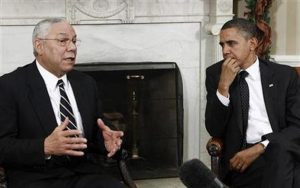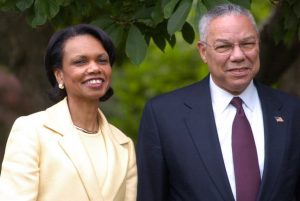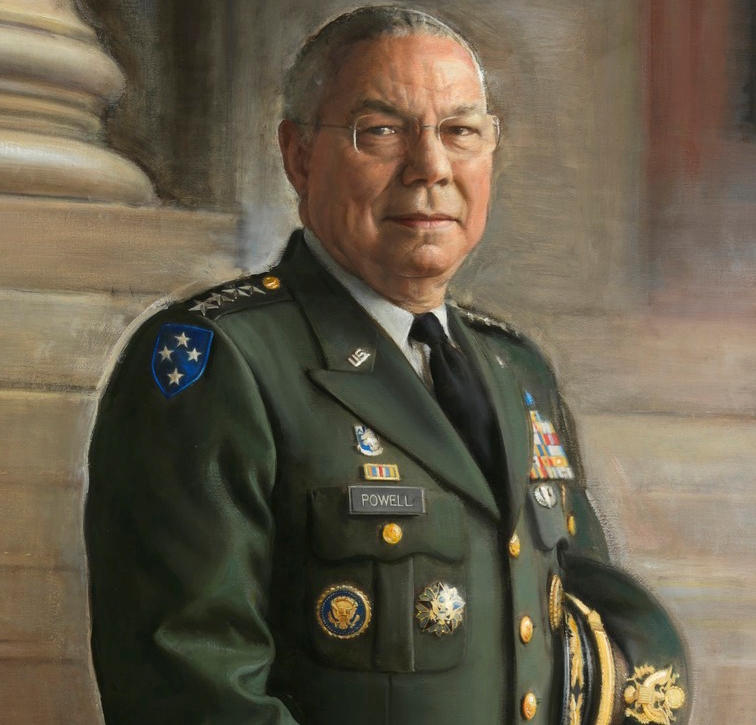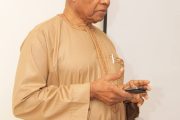An informed commentator told Intervention that the death of General Colin Powel from Covid-19 is a very sad news. “He was a decent man but was misled by George Bush and his Neocon cabinet members such as Donald Rumsfeld and Dick Cheney to lie at the UN that Saddam Hussein had weapons of mass destruction. He deeply regretted that lie when the facts were revealed. May he rest in eternal peace”.

Two of the most prominent members of the Neocons to George Bush’s left – Cheney and Rumsfeld. Can they regain History?
His tribute captures the irony about the deceased top black achiever – everything he did pitched him against his own kith and kin or the belief that he did so to appease the American whites. He never managed to come off the image of the signifier for over-compensation to the whites. A young but angry African-American blurted out to delegates at a 2003 function against Colin Powel: if there is a job and there is an African-American competing against a white American for it, Colin Powel would say, let the white American have it.
This was held against him for much of the time in a manner that some people would argue did not reckon with the tight situation he appeared to be in. The racial balance of power in America meant that it was risky for him to shout too much as a black who had penetrated and risen within the system. But, for not shouting, he was seen as a sell out and looked down upon by his own people or the people he had become a symbol as someone from Jamaica, (not Martinique as previously reported) who should know about slavery, discrimination and inequality. What a tough luck it must have been for him.
In the end, he was compared more with Condoleezza Rice and contrasted with Mohammed Ali, two other symbols of successfully rising within a system that discriminates against their types. While Rice is the signifier of the strategy of defiance of silence – neither refuting nor confirming, Mohammed Ali was/is the all time hero respected across the board not just for the genius of his boxing but even more for his politics of boxing.

Powel and Obama
He thus came off too far from Barack Obama, for example, the ultimate image breaker, the African who became the king of the world. Ruling the United States of America is comparable to being the king of the world, the United States being a hyperactive great power with interests which it defends very aggressively in every corner of the world. An African ruling the world simply wrecked the racial architecture of what Queen Mary University of London scholar, Clive Gabay, calls ‘Whiteness and the Western gaze’ in his wave making book Imagining Africa with the above sub-title, a book which offers a remarkable point of departure in understanding the African story.
But Obama was a wise king, turning up an asset rather than a liability at a crucial point for a troubled great power. By sending a message to Arabs in the language of their religion in a Cairo meeting; suggesting to blacks across the world that it was time to unclench the fist and by not directly alienating the white community of which he too is, he became the unbeatable manager of complexity on a global scale. It was too much for the Swedish Academy, for instance, that they couldn’t help awarding him the Nobel Peace prize even while still in office, warts and all.
It is not every now and then an Obama emerges and melts very well with the contradictions on the ground. Even then, Obama as a person sends a message to all disadvantaged persons and people – the message of pulling himself by the bootstraps that black intellectuals such as Booker Washington canvassed. He went to Harvard where his father met his mother. All his grandparents fought in the World Wars and he was the first black president of the Harvard Law Review. Above all, he was conscious of his racial trajectory and had written it down rather than gossiping about it. In doing so, he forewarned that if he was not aggressive about identity, it was/is not because he is in denial or ignorant of it.
Pitched against these samples of black heroism in the US and the different pathways by which they made it, Powel remained but the model in popular imagination. It is not clear how much his image changed with his very frontal attack on the Trump power imaginary in the countdown to last November voting, including a powerful deconstruction of Trump’s reference to George Floyd in the speech on the racial protests then.

The late Gen. Colin Powel and the living Condoleezza Rice
History is not written once and for all. It is possible a different history of General Collin Powel emerges in the aftermath of his death, one that is probably more sympathetic to his own side based on more details of his own struggles within a system that is also very tough. It is even more so that he fell to Covid-19, thereby making him a warning to the world of the threat from ‘the globalisation of diseases’ and the politics of controlling it.
Only last week, The Economist of London was writing about China being the main country that does not wish to live but crush or eliminate the virus. And it is still about the only country still stuck to that line as other countries with “zero-covid” policies such as Australia, New Zealand and Singapore were moving towards relax the policy.
A recent visitor from another part of Europe into the UK is still in shock, comparing it to coming to another planet. “People in the UK don’t take Covid seriously, he said, pointing out how no one wears a mask in shops, public transport and other enclosed spaces or how one could eat in a restaurant without a COVID certificate. Calling the contrast between his own part of continental Europe and the UK really breathtaking, he notes how even the bars overflow to the terraces and some streets with no one wearing masks in the shops, public transport or “at the stadium in today’s match”.
He concludes that it is not surprising that UK Covid cases and deaths are still high. “Two days ago, there were 45,000 Covid infections in the UK and 145 deaths, compared to 970 infections in Switzerland and zero death. The UK’s population is eight times larger than the Switzerland’s, but it has more than 45 times the number of Swiss infections and more than 145 times its deaths”, lamented the observant visitor who is going all over the place with the protocol in his own part of Europe where he came from.




























